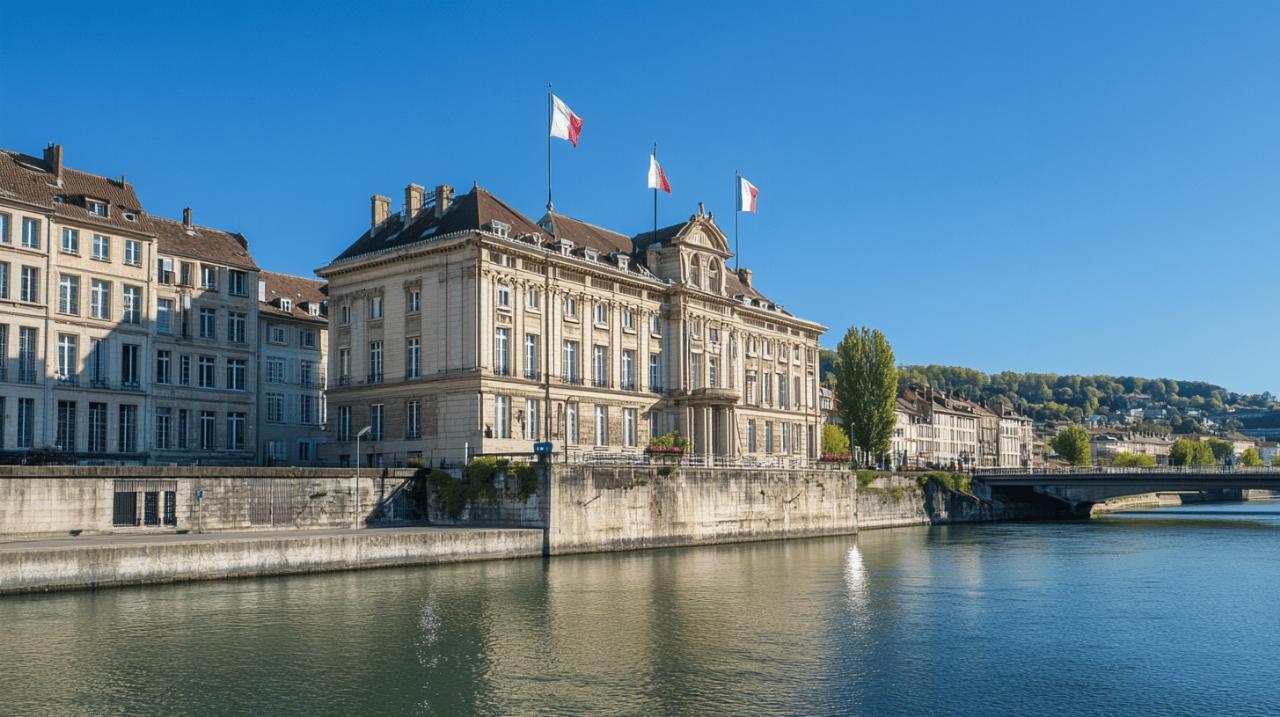
In a city where tradition and progress intertwine, the leadership of Mayor Anne Vignot has begun to reshape the landscape of social care in Besançon. From the rural outskirts of Vellerot to the bustling heart of the city centre, a quiet revolution is taking place—one that prioritises the most vulnerable, champions inclusivity, and forges new pathways for community support. This transformation is not the work of one individual alone but a collective effort involving dedicated local figures, grassroots organisations, and a progressive political coalition that has placed social justice at the forefront of its agenda. As Besançon navigates the challenges of modern urban life, its approach to social care offers a compelling model for other cities seeking to balance green politics, community cohesion, and the needs of diverse populations.
Transforming community support: mayor vignot's vision for besançon's most vulnerable
Mayor Anne Vignot has brought a refreshing perspective to local governance, emphasising the importance of reaching every corner of the city and beyond. Her administration has been marked by a determination to ensure that social care is not confined to urban centres but extends to rural and semi-rural areas where residents often feel forgotten. This vision is rooted in the understanding that true social equity requires infrastructure and support that transcends geographical boundaries. Under her leadership, Besançon has witnessed the development of initiatives that connect outlying communities with the resources and services traditionally concentrated in the city centre. The goal is to create a seamless network of care that responds to the needs of all residents, regardless of where they live.
The vellerot initiative: bridging rural and urban social services
One of the most notable achievements of the Vignot administration is the Vellerot Initiative, a pioneering project designed to bridge the gap between rural and urban social services. Vellerot, a small locality on the periphery of Besançon, has long been emblematic of the challenges faced by communities outside the city centre. Limited access to healthcare, social work, and community programmes has left many residents feeling isolated. The initiative seeks to address these disparities by establishing satellite service hubs that bring essential support directly to residents. These hubs offer a range of services, from mental health counselling to employment assistance, and are staffed by professionals who understand the unique needs of rural populations. The initiative has been lauded for its practical approach and its commitment to ensuring that no one is left behind. By decentralising social care, the administration has not only improved access but also fostered a sense of inclusion and recognition among residents who previously felt marginalised.
How Joseph and Claude Are Leading Grassroots Change in Local Neighbourhoods
At the heart of this transformation are individuals like Joseph and Claude, two community organisers who have dedicated themselves to grassroots change in local neighbourhoods. Joseph, a former social worker, has spent years building relationships with residents and understanding the barriers they face in accessing support. His work has focused on creating informal networks of care, where neighbours look out for one another and share resources. Claude, meanwhile, has concentrated on mobilising volunteers and establishing community centres that serve as safe spaces for dialogue and mutual aid. Together, they have become the linchpins of the mayor's vision, translating policy into action and ensuring that the voices of ordinary residents are heard. Their efforts have demonstrated that effective social care is not only about institutional reform but also about empowering communities to take ownership of their own wellbeing. Through workshops, social gatherings, and outreach programmes, Joseph and Claude have helped to weave a stronger social fabric across Besançon, proving that change often begins at the most local level.
Green politics and social justice: the progressive coalition reshaping besançon
The transformation of social care in Besançon cannot be separated from the broader political context in which it is unfolding. Mayor Vignot's administration is underpinned by a progressive coalition that brings together green politics and social justice in a manner that is both innovative and deeply principled. This alliance has challenged conventional approaches to urban governance, arguing that environmental sustainability and social equity are not competing priorities but mutually reinforcing goals. The coalition has championed policies that address climate change while simultaneously tackling poverty, housing insecurity, and social exclusion. This dual focus has resonated with a population increasingly aware of the interconnectedness of ecological and social challenges. By integrating green principles into social policy, Besançon has positioned itself as a city that looks to the future while addressing the immediate needs of its residents.
Francisco Bautista and the Environmental-Social Care Alliance
A key figure in this progressive coalition is Francisco Bautista, an advocate for the environmental-social care alliance that has become a hallmark of the current administration. Bautista, who has a background in environmental science and community development, has worked tirelessly to demonstrate how sustainable practices can enhance social outcomes. He has spearheaded projects that combine urban greening with community health initiatives, such as the creation of community gardens in deprived areas where residents can grow their own food, reducing both food insecurity and carbon footprints. Bautista's approach is grounded in the belief that environmental degradation disproportionately affects the most vulnerable, and that any serious effort to combat it must include measures to support those communities. His work has helped to shift the narrative around green politics, positioning it not as an elite concern but as a matter of social justice. Through his leadership, the environmental-social care alliance has become a powerful force for change in Besançon, influencing policy and inspiring similar initiatives across the region.
Conte and Reud's Collaborative Approach to Sustainable Community Development
Supporting Bautista's efforts are two other prominent figures in the coalition: Conte and Reud. Both have been instrumental in fostering a collaborative approach to sustainable community development. Conte, a seasoned urban planner, has focused on designing public spaces that are both environmentally friendly and conducive to social interaction. His projects include the redesign of several neighbourhoods to prioritise pedestrian access, green spaces, and community facilities. Reud, on the other hand, has concentrated on building partnerships between local government, non-profit organisations, and the private sector. Her work has facilitated the funding and implementation of numerous initiatives that might otherwise have struggled to get off the ground. Together, Conte and Reud have demonstrated the power of collaboration in achieving sustainable development. Their efforts have ensured that Besançon's transformation is not a top-down imposition but a genuinely participatory process that draws on the expertise and commitment of a wide range of stakeholders. This collaborative ethos has become a defining feature of the city's approach to social care and environmental sustainability.
Migration and Integration: New Models for Supporting Besançon's Diverse Communities
 As Besançon has evolved, so too has its demographic composition. The city has welcomed increasing numbers of migrants and refugees, bringing with them diverse cultures, languages, and experiences. This diversity has enriched the social and cultural life of Besançon, but it has also presented challenges in terms of integration and access to services. The Vignot administration has recognised that effective social care must be responsive to the needs of newly arrived communities, and it has developed innovative models to support integration. These models are built on the principle that inclusion is a two-way process, requiring both support for migrants and efforts to foster understanding and acceptance among the wider population. The result has been a series of initiatives that aim to break down barriers, promote dialogue, and ensure that all residents, regardless of their background, can access the care and support they need.
As Besançon has evolved, so too has its demographic composition. The city has welcomed increasing numbers of migrants and refugees, bringing with them diverse cultures, languages, and experiences. This diversity has enriched the social and cultural life of Besançon, but it has also presented challenges in terms of integration and access to services. The Vignot administration has recognised that effective social care must be responsive to the needs of newly arrived communities, and it has developed innovative models to support integration. These models are built on the principle that inclusion is a two-way process, requiring both support for migrants and efforts to foster understanding and acceptance among the wider population. The result has been a series of initiatives that aim to break down barriers, promote dialogue, and ensure that all residents, regardless of their background, can access the care and support they need.
Enrique bugnet's pioneering work with newly arrived families
Leading the charge in this area is Enrique Bugnet, whose pioneering work with newly arrived families has set a new standard for integration support. Bugnet, who himself has a background in migration studies, has developed programmes that address the specific challenges faced by migrants, from language barriers to navigating unfamiliar bureaucratic systems. His approach is holistic, recognising that successful integration depends on a range of factors including housing, employment, education, and social connections. One of his most successful initiatives has been the establishment of welcome centres where families can receive advice, attend language classes, and connect with other residents. These centres serve as vital hubs of information and support, helping to ease the transition into a new community. Bugnet's work has been characterised by a deep empathy and a commitment to treating each family as individuals with unique needs and aspirations. His efforts have not only helped migrants to settle more successfully but have also enriched the broader community by fostering a spirit of openness and mutual respect.
Pedro and Antoine's Cross-Cultural Outreach Programmes in the City Centre
Complementing Bugnet's work are the cross-cultural outreach programmes led by Pedro and Antoine in the city centre. Pedro, a community liaison officer, has focused on creating opportunities for cultural exchange and dialogue. His programmes include language cafes, cultural festivals, and workshops where residents from different backgrounds can share their stories and learn from one another. Antoine, meanwhile, has concentrated on engaging local businesses and organisations in the integration process. He has worked to create employment pathways for migrants and to challenge prejudice and discrimination in the workplace. Together, Pedro and Antoine have helped to build a more inclusive city centre, where diversity is celebrated and where all residents feel they have a stake in the community. Their outreach programmes have been particularly effective in breaking down stereotypes and fostering genuine connections between people. By facilitating regular interaction and collaboration, they have shown that integration is not about assimilation but about creating a shared space where different cultures can coexist and thrive. Their work has been a vital component of Besançon's social care revolution, demonstrating that successful integration requires both targeted support for migrants and broader efforts to promote cultural understanding.
Local heroes: the unsung champions of besançon's social care revolution
Behind the headlines and policy announcements are countless individuals whose dedication and creativity have driven the social care revolution in Besançon. These local heroes may not hold official titles or command large budgets, but their contributions are no less significant. They are the volunteers, community organisers, and activists who work tirelessly to support their neighbours and to build a more compassionate society. Their stories are a reminder that meaningful change often comes from the ground up, from people who see a need and choose to act. In recognising these individuals, we celebrate not only their achievements but also the values of solidarity and mutual aid that underpin the transformation of Besançon.
Belon's community kitchen project: feeding bodies and building connections
One such hero is Belon, whose community kitchen project has become a cornerstone of social care in several neighbourhoods. Belon, a chef by training, was moved by the number of residents struggling with food insecurity and social isolation. Her response was to create a community kitchen where people could come together to prepare and share meals. The project serves a dual purpose: it provides nutritious food to those in need, and it creates a space for social interaction and community building. The kitchen has become a gathering place where residents from all walks of life can connect, share stories, and support one another. Belon's approach is rooted in the belief that food is more than sustenance; it is a means of bringing people together and fostering a sense of belonging. The project has grown steadily, attracting volunteers and donations from across the city. It has also inspired similar initiatives in other neighbourhoods, demonstrating the power of grassroots action to address complex social issues. Belon's work has not only fed bodies but has also nourished the social fabric of Besançon, creating connections that extend far beyond the kitchen walls.
Germain's youth mentorship scheme: investing in besançon's future
Another unsung champion is Germain, whose youth mentorship scheme has had a profound impact on the lives of young people in Besançon. Germain, a former teacher, recognised that many young people, particularly those from disadvantaged backgrounds, lacked the guidance and support needed to navigate the transition to adulthood. His mentorship scheme pairs young people with experienced mentors who provide advice, encouragement, and practical support. The scheme covers a range of areas, from education and career planning to personal development and social skills. Germain's approach is characterised by a deep respect for the potential of every young person and a commitment to helping them realise their ambitions. The scheme has been transformative for many participants, opening up opportunities and building confidence. It has also had a broader impact on the community, fostering intergenerational connections and challenging negative stereotypes about young people. By investing in the next generation, Germain has contributed to the long-term sustainability of Besançon's social care revolution. His work is a testament to the power of mentorship and the importance of believing in the potential of young people. Through his dedication and vision, Germain has helped to ensure that the benefits of the city's transformation are felt not only today but for years to come.



